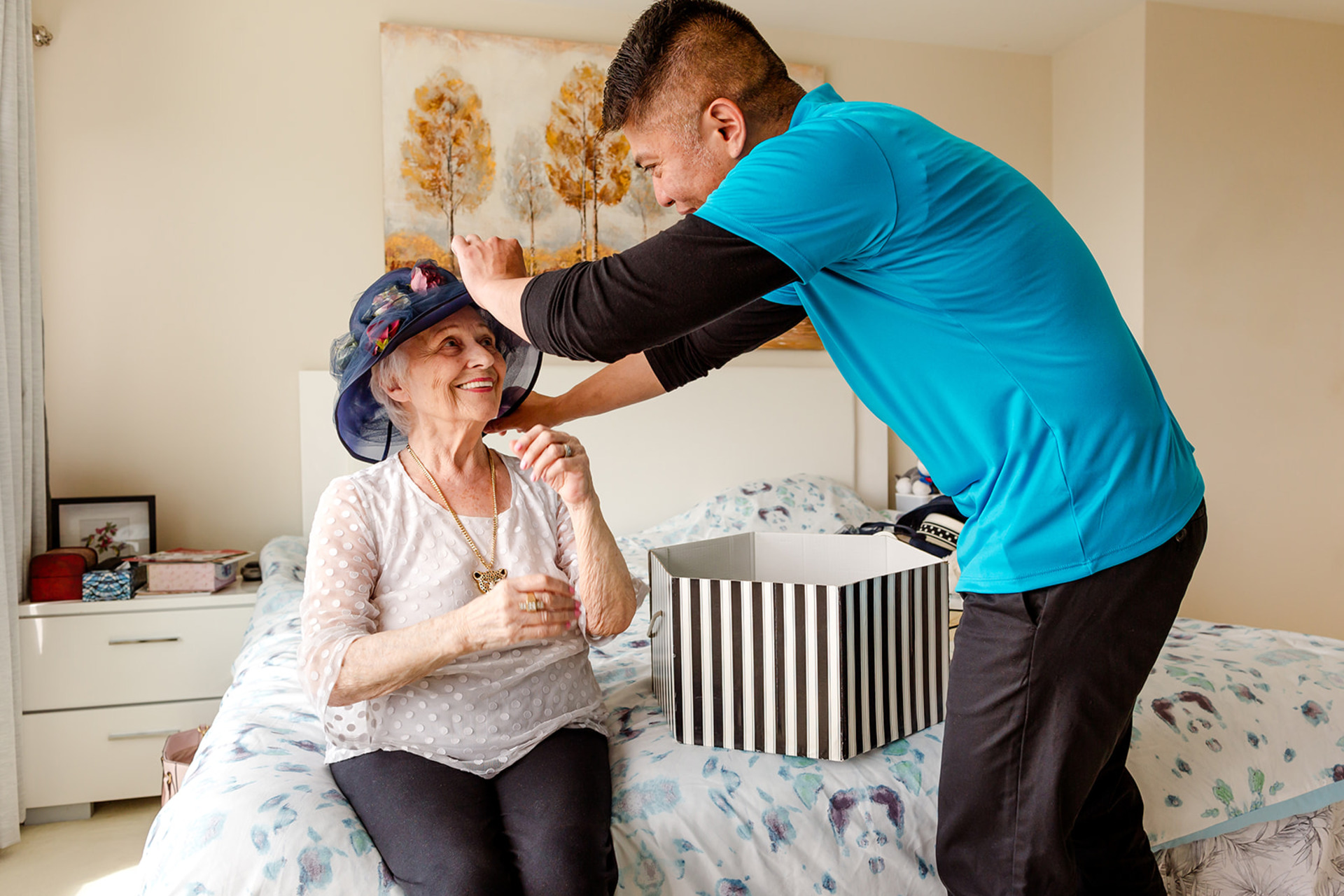Did you know that 77% of older adults would choose to live in their current home (or with family) if given the choice? Many feel a loss of independence and often dignity when they’re forced out of their family home and into a long-term care facility. It can trigger feelings of stress, anxiety, social isolation, and even depression.
However, there are strategies to help your loved one live in their home as long as possible.
In this article, we’ll discuss how aging in place helps seniors maintain their dignity and independence and how a home care aide can improve their quality of life while they live in their family home.
What is “aging in place?”
Aging in place refers to seniors living in their homes as long as possible rather than moving to a long-term care home or supervised retirement community. It means the senior lives independently in their home as long as possible. They may hire home care workers or family to support them, but the senior gets to age in their home.
The concept of aging in place may have roots in traditional family structures of previous generations. In some families, it was common for the younger generation to move into their aging family members’ homes to help take care of them (before the days of long-term care facilities). Sometimes, the senior family member would move into the younger generation’s home.
The benefits of living at home
Aging in place provides stability in a time of our lives when it seems everything is changing and is becoming out of our control. However, you can maintain most of your independence and freedom at home.
Here are the top 5 benefits of seniors aging in place:
- Maintains independence (without having someone looking over their shoulder all the time, except in the case of having family or a home care aide assisting them)
- Maintains a sense of familiarity and normalcy (living in your own home and carrying out your routines and activities as usual or close to normal)
- Supports a stronger sense of identity (being around their belongings and things)
- Staying more socially connected (when they’re living close to their friends and not in a care home several cities away)
- May have financial benefits (if income doesn’t support the expenses of monthly rent in a care facility)
However, there are cautions to aging in place that you need to be aware of:
- Living at home can increase one’s chances of injury, especially if the senior doesn’t accept help for tasks and routines they can no longer safely do alone such as yard work, personal hygiene, and using stairs.
- There is a risk of social isolation while living at home if the senior refuses to leave for socialization activities or doesn’t invite others to visit.
- The senior may need a home care aide or support. Hiring a home care aide is a great way to extend the aging-in-place process as long as possible.
Why a personalized approach to aging in place is important
A senior’s ability to age in place should be independently evaluated with your loved one and their doctor or healthcare providers. Assuming they have no objections, aging in place can significantly benefit seniors.
As you’re considering supporting your loved ones’ desire to age in place, it’s important to remember that this process should be personalized to the individual. How that person ages in place should be determined by consulting their healthcare team and family members, especially when they require help at home.
Aging-in-place seniors should be monitored to ensure their safety as their health and abilities change. Here’s an example of how a senior’s aging-in-place needs may change:
- Year 1: Today, your aging mom and dad are ok and safe living at home, but you come over once a week to help with their yard work as their knees are weakened from Arthritis.
- Year 2: Sadly, one parent passes away, and the remaining parent is physically and mentally unable to keep up with the housework and their physical health. You may bring in a housekeeper every few days to help around the house and drive your parent to weekly exercise classes at the community centre with their friends. If you go out of town for an extended period, you can hire a home care companion aide to regularly call to check in with your parent to ensure they’re doing well.
- Year 3: Your parent now primarily uses a wheelchair for mobility due to a permanent hip injury. You hire help to install handrails in the bathroom, a ramp up the front steps and move furniture to ensure mobility around the home is safe. You also hire help for domestic responsibilities and someone to keep them company during the weekdays when you’re at work. You and your adult siblings take turns spending the weekend to help.
- Year 4: Your parent is now on several medications that require regular dosing and regular vitals. You hire a full-time medical care aide to support their medical supervision, help with domestic tasks, and even cook meals with (or for) your parent.
As you can see from this example, small changes in lifestyle and health don’t necessarily mean they need to move into a care home. As long as you have a plan to help them maintain their independence as long as possible, you can support their desire to age in place safely.
How to help your loved one age in place
You can help your able-bodied and able-minded senior age in place by checking in on them often. If you notice their health deteriorating and it’s affecting their safety, health, and social well-being, talk with their doctor and consider bringing in a home care aide to support the gaps in the senior’s independence.
While you may want to be the one to help, you have your own life to live (and possibly a young family of your own). It will benefit everyone if you bring in a care aide to help when you can’t. Accepting help from your adult children can be challenging, especially for their basic household or personal hygiene tasks. Sometimes, it may be easier for your senior to get help from a professional caregiver.
Hero Home Care offers a range of services designed to help your senior loved ones maintain their independence at home for as long as possible. Our home care aides provide not just nursing care, but also social companionship, domestic support, meal planning and cooking, and even transportation to the doctor or for their social gatherings and classes. We can even arrange regular phone check-ins to ensure their health and well-being when a care aide or family member is unavailable.
Our services are tailored to meet the unique needs of each senior. Whether they require minimal assistance or more comprehensive care, we’re here to help them maintain their independence at home.
When the going gets tough, a hero steps up! Book a free care consult today to learn how we can help your aging loved ones safely live in their beloved home and age with dignity and independence.

